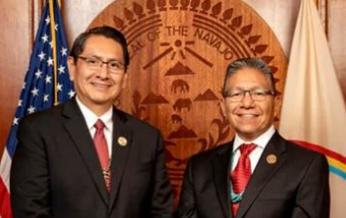
- Details
- By Levi Rickert
WINDOW ROCK, Ariz. — The president and vice president of the Navajo Nation are now under self-quarantine after they discovered they were in close proximity Tuesday to a first responder who since has been tested positive for COVID-19.
The announcement was made by Navajo Nation President Jonathan Nez himself during an online town hall meeting. He and Vice President Myron Lizer both participated in the online town hall.
Both are said to be feeling fine, according to a press release issued Thursday afternoon.
“This is real and no one is immune from contracting the virus. We will continue to help fight for our people while we self-quarantine – this is a precautionary measure. While meeting with the U.S. Army Corps of Engineers and the Arizona National Guard, we came into contact with several first responders, one of whom later tested positive for the virus. I’ve been informed that the officials with the Army Corps and National Guard are also self-quarantining to be on the safe side and are doing fine. Our prayers are always with our first responders and many others who are impacted by the virus,” Nez said.
Even before the first two confirmed cases on the Navajo Nation were announced on March 17, the two leaders have worked tirelessly to help stop the spread of the deadly virus on the Navajo Indian Reservation. As of Wednesday evening, Navajo Nation has had 488 confirmed cases of COVID-19 and 20 deaths from the deadly virus.
In every visit to Navajo communities during the pandemic, Nez and Lizer each took precautionary measures by wearing gloves and masks.
Both Navajo leaders will continue self-quarantining themselves as a precaution, and will continue their duties through teleconferences, e-mail, and other means of communication.
Several staff employees who work closely with the president and vice president have also been directed to self-quarantine.
The Centers for Disease Control and Prevention defines self-quarantining as separating or restricting the movement of people who were exposed to a contagious disease to see if they become sick.
For more information including reports, helpful prevention tips, and more resources, please visit the Navajo Department of Health’s COVID-19 website at http://www.ndoh.navajo-nsn.gov/COVID-19. To contact the main Navajo Health Command Operations Center, please call (928) 871-7014.
More Stories Like This
Native News Weekly (August 25, 2024): D.C. BriefsUS Presidents in Their Own Words Concerning American Indians
Two Murdered on Colville Indian Reservation
NDAA passes House; Lumbee Fairness Act Advances
NFL, Vikings to Host Native All-American Game, Youth Flag Clinic
Help us defend tribal sovereignty.
At Native News Online, our mission is rooted in telling the stories that strengthen sovereignty and uplift Indigenous voices — not just at year’s end, but every single day.
Because of your generosity last year, we were able to keep our reporters on the ground in tribal communities, at national gatherings and in the halls of Congress — covering the issues that matter most to Indian Country: sovereignty, culture, education, health and economic opportunity.
That support sustained us through a tough year in 2025. Now, as we look to the year ahead, we need your help right now to ensure warrior journalism remains strong — reporting that defends tribal sovereignty, amplifies Native truth, and holds power accountable.
 The stakes couldn't be higher. Your support keeps Native voices heard, Native stories told and Native sovereignty defended.
The stakes couldn't be higher. Your support keeps Native voices heard, Native stories told and Native sovereignty defended.
Stand with Warrior Journalism today.
Levi Rickert (Potawatomi), Editor & Publisher

